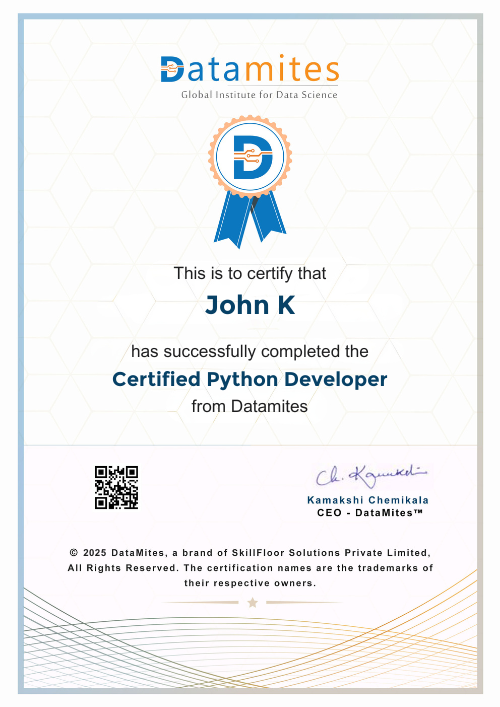Instructor Led Live Online
Self Learning + Live Mentoring
Customize Your Training

• Introduction of python
• Installation of Python and IDE
• Python Variables
• Python basic data types
• Number & Booleans, strings
• Arithmetic Operators
• Comparison Operators
• Assignment Operators
• IF Conditional statement
• IF-ELSE
• NESTED IF
• Python Loops basics
• WHILE Statement
• FOR statements
• BREAK and CONTINUE statements
• Basic data structure in python
• Basics of List
• List: Object, methods
• Tuple: Object, methods
• Sets: Object, methods
• Dictionary: Object, methods
• Functions basics
• Function Parameter passing
• Lambda functions
• Map, reduce, filter functions
• Decorators
• Generators
• Context Managers
• Metaclasses
• Inheritance and Polymorphism
• Encapsulation and Abstraction
• Class methods and static methods
• Special (magic/dunder) methods
• Property decorators - getters, setters, and deletes
• Working with files
• Reading and writing files
• Buffered read and write
• Other file methods
• Logging & Debugger
• Modules and import statements
• SQL Basics
• Creating DB Table
• INSERT, READ, UPDATE, DELETE
• Introduction to MongoDB
• CRUD operations in MongoDB
• namedtuple(), deque, ChainMap,
• Counter, OrderedDict, defaultdict,
• UserDict, UserList, UserString
• Exceptions handling with try-except
• Custom exception handling
• List of general use exception
• Best practice exception handling
• Generators, Iterators
• The Functions any and all
• With Statement
• Data Compression
• A Daytime Server
• Clients and Servers
• The Client and Server Programs
• Classes and Threads
• Multi-threading; thread life cycle
• Regular Expression Syntax
• Group, Split and wildcards
• Quantifiers
• Match, Search and Find all methods
• Character Sequence
• Introduction to OpenCV, Installation
• Basic Operations on Images
• Image Filtering
• Image Classification
• Introduction to GIT
• Basic Git commands
• Introduction to Flask and Installation
• Creating project
• Routing,templates, forms and database integration
• Deployment on render
• Django Introduction and Installation
• Creating a Project
• Django Architecture and File Structure
• Folder Structure, First Django project
• Database and Views, Static Files and Forms
• URL Mapping and Routing
• Defining Models and Relationships
• Database Migrations and Schema Changes
• Querying Data using Django ORM
• Model Forms and Form Validation
• HTML Forms in Django
• Model Forms and Form Validation
• Formsets and Inline Formsets
• File Uploads and Validation
• Deploying Django Applications
• Hosting Options (e.g., Heroku, AWS)
• Project Showcasing and Review
Python is a programming language that emphasizes clear syntax and readability. Its versatility and extensive libraries have made it a popular choice for applications such as scientific computing, machine learning, and web development.
Python, the programming language known for its concise syntax and readability, was instigated in 1991 by Guido van Rossum. The Python Software Foundation played a key role in its development.
Python programming provides several advantages, such as its ease of use, large community, vast libraries, and cross-platform support. It is also an open-source language that is easy to learn and has a simple syntax, making it an ideal choice for beginners.
Python is considered to be a relatively easy language to learn, owing to its straightforward syntax and the availability of abundant learning resources. Its diverse applications, such as data analysis, machine learning, and web development, make it an essential language for anyone interested in programming.
Python expertise is essential for a range of roles, including full-stack developers, data engineers, quantitative analysts, DevOps engineers, scientific programmers, and automation engineers.
Yes, you can learn Python without any prior knowledge. Python courses in Medina are designed for beginners and cover the basics of Python programming, starting with variables, data types, and control structures and progressing to more advanced topics such as functions, modules, and object-oriented programming.
The Python training fee in Medina differs based on the level of training chosen. In general, the fee for classroom/online training ranges from 1000 AED to 3000 AED.
To learn Python programming, technical skills such as basic programming knowledge, mathematical and analytical thinking, and logical reasoning are essential. Additionally, important soft skills such as problem-solving abilities, attention to detail, time management, communication skills, and creativity are required.
According to salaryexpert.com, the average python developer salary in Medina is SAR 231,484 per annum.
Python certification in Medina can be advantageous for your career in various ways. It can exhibit your mastery of the language, making you an attractive prospect for employers in diverse fields. This can result in better job options, higher earnings, and enhanced job security. Moreover, Python certification can elevate your credibility and standing as a professional, potentially unlocking new career avenues and opportunities for advancement.
The length of the Python course in Medina depends on the area of expertise you opt for. Typically, the course duration ranges from 2 to 4 months. The sessions are held on weekdays as well as weekends, enabling you to select the batch that fits your availability. Specifically, the Python Developer Course in Medina runs for 4 months.
DataMites is a reputable option for learning Python programming in Medina. The institute offers comprehensive course materials, seasoned trainers, and adaptable scheduling options, providing students with the tools and resources they need to succeed in the field of Python programming.
The cost of Python Training at DataMites in Medina depends on the mode of training you choose. The Python Course Fees range from 994 SAR to 1820 SAR, while the Certified Python Developer Training Fees range from SAR 1228 to SAR 2840, depending on the mode of training you opt for.
No, DataMites in Medina does not offer offline Python training. However, we do provide an online training program.
The Flexi-Pass for Python training at DataMites provides additional access to training resources, allowing students to attend sessions related to any queries or revisions beyond the standard course duration.
Yes, upon completing our Python training in Medina, you will receive an IABAC® certification that is recognized worldwide and proves your mastery of Python programming.
Yes, we have provisions for additional support sessions for Python training students who need more explanation. Our trainers are always ready to assist and guide you in achieving your learning goals.
To pay for the Python Training Online in Medina offered by DataMites, you can choose from different payment options such as Cash, Net Banking, Check, Debit Card, Credit Card, PayPal, Visa, Mastercard, and American Express.
Upon successful completion of the Python course, a certificate is issued by DataMites.
he Python training in Medina is provided by certified trainers who have years of industry experience and in-depth knowledge of the subject.
The DataMites Placement Assistance Team(PAT) facilitates the aspirants in taking all the necessary steps in starting their career in Data Science. Some of the services provided by PAT are: -
The DataMites Placement Assistance Team(PAT) conducts sessions on career mentoring for the aspirants with a view of helping them realize the purpose they have to serve when they step into the corporate world. The students are guided by industry experts about the various possibilities in the Data Science career, this will help the aspirants to draw a clear picture of the career options available. Also, they will be made knowledgeable about the various obstacles they are likely to face as a fresher in the field, and how they can tackle.
No, PAT does not promise a job, but it helps the aspirants to build the required potential needed in landing a career. The aspirants can capitalize on the acquired skills, in the long run, to a successful career in Data Science.



